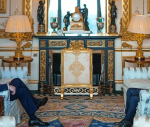You are here
The African paradox
Mar 03,2014 - Last updated at Mar 03,2014
Earlier last month, the trial of Pascal Simbikangwa, accused of complicity in the genocide in Rwanda, in which 800,000 people were killed between April and July 1994, began in Paris.
Unfortunately, mass killings in Africa continue.
In South Sudan, Africa’s newest state, massacres of civilians are still taking place, particularly around the city of Bor.
And French military intervention in the Central African Republic has not put an end to severe inter-communal violence there.
Yet, paradoxically, even as such episodes continue to occur in Africa, perhaps on a larger scale than anywhere else in the world, the continent has also become a beacon of hope.
Indeed, the perpetuation of extreme violence contrasts starkly with Africa’s favourable demographic profile and its economic — and even political and social — progress in recent years.
One way to think about this paradox is in terms of the closing of a four-century-long parenthesis.
Since the 17th century, Africa has been mainly an object of history.
Its people were first treated by the slave trade as mere commodities, necessary for economic growth elsewhere.
Then colonial powers carved up the continent artificially and arbitrarily, masking their greed behind noble-sounding goals: theirs was a “civilising” mission.
Later, during the first half of the 20th century, Africa offered the blood of its inhabitants, and then recourse to its territories, to a European continent in the throes of two world wars.
And, in the second half of the 20th century, after a brutal anti-colonial struggle, Africa’s newly independent countries became proxy battlegrounds in the Cold War.
Today, by contrast, Africa is in the process of returning as a subject of history. With more than one billion inhabitants, representing 18 per cent of the world’s population, Africa is regaining the place it occupied at the beginning of the 16th century. Then, with 100 million people, it represented 20 per cent of the world’s population.
By the middle of the 19th century, after more than 200 years of colonialism and slavery, Africa’s population had fallen to 95 million — just 9 per cent of the world total — whereas other continents had experienced a large population increase over the same period.
Economically, sub-Saharan Africa has experienced a decade of 5-6 per cent average annual GDP growth.
In Tanzania, growth this year should be around 7 per cent. At a time when the major emerging economies — with the exception of China — are facing a sharp slowdown, Africa, with its untapped energy resources and precious raw materials, including rare earth minerals, has naturally become a focus of investors’ attention.
But, though Africa can be described as the continent of hope, it is unlikely to become the “New Asia” — that is, a long-term dynamo of global growth — for a combination of cultural, political, geopolitical, and perhaps psychological reasons.
Asia has experienced the historical continuity of great empires.
China is the best illustration of this phenomenon. It is a re-emerging power, not an emerging one, a decisive factor that explains Chinese confidence.
Asia’s long history of rivalry and competition among its various powers has also been an important factor in its recent economic success. The dynamic of competition and emulation among China, Japan, and South Korea has not existed in peacefully reconciled post-World War II Europe; there is nothing like it in Africa, either.
Nigeria is not Africa’s equivalent of what China is for Asia. And post-apartheid South Africa, for all its progress, has not fulfilled the expectations placed on it, and remains unlikely to become the continent’s gendarme.
Colonialism and the slave trade constituted a historical rupture for Africa. Beyond the human toll — including 10-15 million direct victims — absolute subjugation begot a unique loss of confidence. Who today can name Africa’s great empires and kingdoms?
Who knows where the worlds’ gold came from before its discovery in Latin America in the 16th century?
Africa must find the confidence it desperately needs in the way others look at it. The problem is that others are abysmally ignorant about the continent’s pre-colonial past.
One may criticise the cynicism of the Chinese, but it is China that has contributed more than any other country to the transformation of Africa’s self-image.
Today, it is Africans themselves who hold their continent’s future in their hands. And, as Africa returns as a subject, rather than an object, of world history, it appears to embody all the fears and hopes of humanity.
Everything is there in extreme form: desertification, mass movements of populations and, yes, genocidal violence — but also the hope for new forms of economic growth, if not new modes of governance.
The writer, a professor at L’Institut d’études politiques de Paris (Sciences Po), is senior adviser at The French Institute for International Affairs (IFRI). He is currently a visiting professor at King’s College London. ©Project Syndicate, 2014. www.project-syndicate.org












